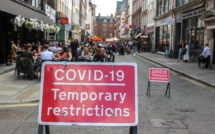

In this section of Campus, EuropeNow features a selection of scholarly articles and books on topics pertinent to the teaching of Europe or teaching in Europe that were published within the last 5 years. This dynamic bibliography, with monthly installments, seeks to highlight both pedagogy research as well as critical analyses of debates taking place in higher education in and about Europe.
If you are interested in reviewing any of the books featured in any of our Campus Round-Ups, please contact our Research and Pedagogy Chair, Hélène Ducros, at helene@alumni.unc.edu
1. Whose Pedagogy is it Anyway? Decolonizing the Syllabus through a Critical Embrace of Difference
By Sulafa Zidani
Abstract: The higher-education student body in the United States is increasingly diverse. Diversity and transnationalism are present in the classroom through the increased numbers of students and instructors who are international and/or non-White-identifying. However, syllabi in media, communication, and cultural studies remain centered around an orthodox body of literature that has come to be conceived of as the canon, consisting of scholars who are mostly white, male, and U.S.-American or European. This essay brings communication, culture, and media studies theories into conversation with critical pedagogy to suggest changes in the organization of syllabi and class activities. Namely, I use participatory culture, critical and decolonial pedagogical theories, and Black and transnational feminist pedagogy, to suggest a critical embrace of different as an approach for designing syllabi that center the students rather than the Western rooted tradition. This paper is part of the critical body of knowledge that pushes for a decolonizing and transnationalizing intervention in higher education.
Find this article in Media, Culture & Society here
2. An Inclusive Pedagogy in Arts and Humanities University Classrooms: What Faculty Members Do
By Rafael Carballo, Almuneda Cotán, and Yolanda Spinola-Elias
Abstract: This article shows the educational strategies developed by faculty members that their students with disabilities considered as excellent for carrying out an inclusive pedagogy in Higher Education. One hundred and nineteen faculty members from 10 Spanish public universities participated in the study, 24 of whom were from the field of Arts and Humanities. Through a qualitative methodology, individual semi-structured interview was used for data collection. The data were analyzed inductively through a categories and codes system. The results show how the participants considered students’ opinions when designing their methods. Moreover, the study shows the teaching strategies that the participants used to ensure the participation of all their students. Lastly, the article describes how the participants attended to the concerns of students with disabilities. Finally, we discuss these results with previous studies, and we consider the main elements for an inclusive pedagogy that may serve as an example for other faculty members.
Find this article in Arts & Humanities in Higher Education here
3. Postcoloniality Without Race? Racial Exceptionalism and Southeast European Cultural Studies
By Catherine Baker
Abstract: The black Dutch feminist Gloria Wekker, assembling past and present everyday expressions of racialized imagination which collectively undermine hegemonic beliefs that white Dutch society has no historic responsibility for racism, writes in her book White Innocence that “one can do postcolonial studies very well without ever critically addressing race.” Two and a half decades after the adaptation of postcolonial thought to explain aspects of cultural politics during the break-up of Yugoslavia created important tools for understanding the construction of national, regional, and socioeconomic identities around hierarchical notions of Europe and the Balkans in the Yugoslav region and beyond, Wekker’s observation is still largely true for Southeast European studies, where no intervention establishing race and whiteness as categories of analysis has reframed the field like work by Maria Todorova on “balkanism” or Milica Bakic-Hayden on ́ “symbolic geographies” and “nesting orientalism” did in the early 1990s. Critical race theorists such as Charles Mills nevertheless argue that “race” as a structure of thought and feeling that legitimized colonialism and slavery (and still informs structural white supremacy) involved precisely the kind of essentialized link between people and territory that Southeast European cultural theory also critiques: the construction of spatialized hierarchies specifying which peoples and territories could have more or less access to civilization and modernity. Southeast European studies’ latent racial exceptionalism has some roots in the race-blind anticolonial solidarities of state socialist internationalism (further intensified for Yugoslavia through the politics of Non-Alignment) but also, this essay suggests, in deeper associations between Europeanness, whiteness, and modernity that remain part of the history of “Europe” as an idea even if, by the end of the twentieth century, they were silenced more often than voiced.
Find this article in Interventions: International Journal of Postcolonial Studies here
4. Student Wellbeing in the Teaching and Learning Environment: A Study Exploring Student and Staff Perspectives
By Elena Riva, Rebecca Freeman, Lauren Schrock, Victoria Jelicic, Cameron-Tosh Özer, and Ruth Caleb
Abstract: Internationally and in the UK universities are facing a crisis of student wellbeing. In this context, it is important to research the impact of the teaching and learning environment and experiences, including the relationships between students and staff, on student wellbeing. While separate pieces of research on students‟ wellbeing have addressed student and teacher perspectives on the role of learning experiences, we identified an opportunity to address the perspectives of both students and staff, including non-academics, in the same study. This study advances work on student wellbeing, recognising an interdependency between staff and student wellbeing. It adds to current research in identifying student-centred learning and assessment, intercultural awareness, international integration, and emotional intelligence as enablers of positive student wellbeing. The findings of this research also demonstrate the crucial role of the teacher-student relationship in impacting students‟ (and staff) wellbeing and suggest solutions and areas for development that reflect the complexity of the Higher Education environment in which they are located.
Find this article in Higher Education Studies here
5. Problem‑based Learning and the Relevance of Teaching and Learning European Studies in Times of Crises
By Patrick Bijsmans and Esther Versluis
Abstract: The succession of economic and financial crises, the migration crisis, and, of course, Brexit have raised many questions about the future of the European Union. Such crises present challenges for teaching and learning European Studies. This article discusses the question how to maintain a relevant study programme while taking into account ever-changing societal developments. Based on a survey conducted among students of a Bachelor in European Studies, and a subsequent focus group discussion, we look at programme relevance and programme capacity to deal with societal change in the context of a problem-based learning environment. Our study reveals that problem-based learning, when applied consistently and correctly, is a good educational approach to ensure that a study programme is relevant and capable of capturing societal change. At the same time, students seem to prefer a more guided version of problem-based learning, which presents challenges concerning its possible contribution to teaching and learning in times of crises. While we discuss the situation in one specific BA programme, we will do so in light of general challenges in the fields of European Studies, International Relations, and Politics.




